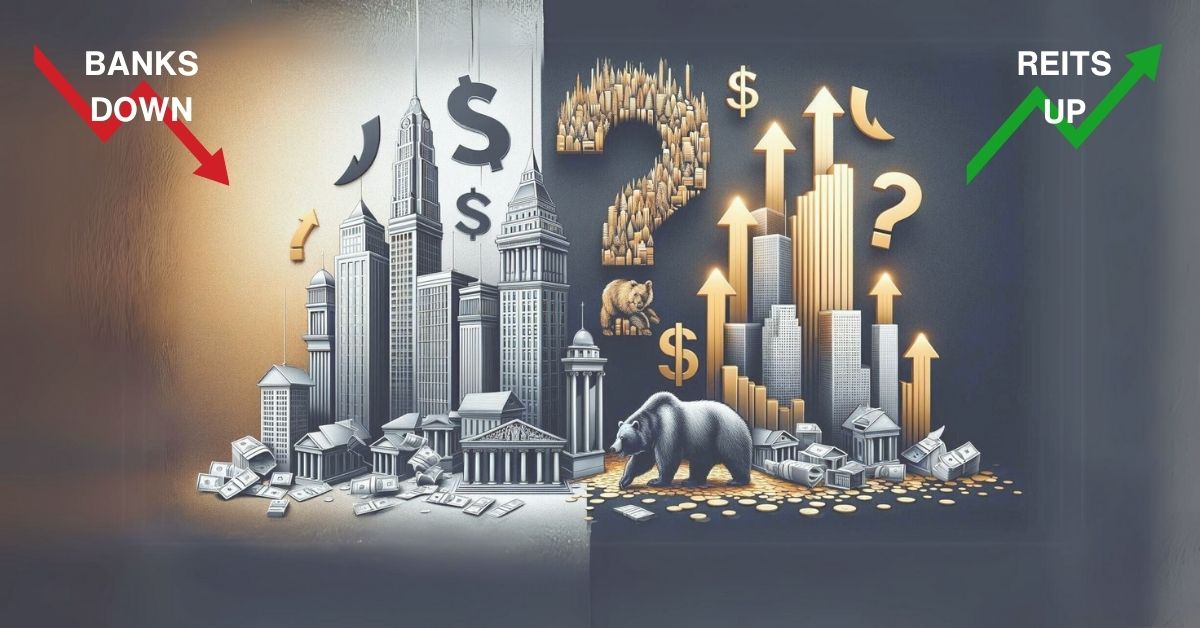Ahh.
The age-old question of sector rotation.
As the latest news of a dovish pivot from the Feds, retail investors are seeing bank shares dragged down, while the much-beaten REIT prices are slowly showing sprouts of life.
So with banks going down due to a near-term interest margin squeeze, and with REITs finally taking a breather from dizzying high-interest expense, is it time to sell the banks, and buy the REITs?
Higher interest rates are going away (sooner than we thought)
A TL;DR if you have not been following the news.
The Federal Reserves turned dovish in the recent meeting. This sent US stocks rocketing to new highs with treasuries tumbling down.
And with news on the interest rates grabbing the headlines, it is easy to tie back the boon and bane for affected sectors.
On paper, companies and businesses utilizing loans will benefit from rate cuts, while the banks will get squeezed by the net interest margins.
How significant are REITs’ performance against interest rates?
Based on an analysis by Nareit, the age-old assumption that REITs will diminish in a high-interest rate environment seems to be a myth.

In fact, in 77% of rising rate periods, REITs generated positive returns.
Yes, interest rate hikes will increase the financing costs of REITs, but stable and growing interest rates also signify robust economic growth.
It is easier for REITs to report positive rental reversion or even find new tenants in a booming economy.
How significant are Banks’ performance against interest rates?
So what about the flip side – do interest rates affect bank stocks’ performances?
According to the Federal Reserve Bank of San Francisco, banks’ net interest margins (NIMs) are relatively stable despite large fluctuations in the federal funds rate over the sample period. NIM has remained in the range between 2.5% and 4% over the last 20 years.

Return on asset also has been stable as well throughout the same period.
Over the years, most banks, especially the larger ones, have pivoted into wealth management, investments, that are not affected if there is a shift in interest rate regime.
REIT case study: Parkway Life REIT

Let’s take a look at Parkway Life REIT (SGX: C2PU).

As a growing REIT, it is normal to see debt growing in tandem. However, interest expense has been pretty flat over the last 10 years. Given that there have been periods of low and high interest rates regime over the last 10 years, it is surprising to see a REIT strategizing its debt maturity so well.

Distributions per unit also show a growing trend over the last 10 years, seemingly unaffected by the fluctuating interest rate cycles.
Bank case study: DBS Group Holding Ltd

Now let’s take a look at DBS Group Holding Ltd (SGX: D05).

A direct correlation and trend can be observed when looking at the NIM trend. DBS’s NIM dropped to its 10-year low of 1.45% during the pandemic-stricken years.

Even though interest income dipped, the non-interest income portion – income from investment securities, trading income, fees, and commission helped cushion the drop in overall performance.

The loan book remained robust, and with growing deposits and higher balances, the overall results do not show DBS being annihilated by the flow and ebb of interest rate policy.
The age-old rule on sector rotation
Just to give you a heads up, sector rotation exists and happens.
It will always make the news headlines for the daily news financial segments.
Sector rotation is very common for big funds and financial institutions. These are the big boys who buy and sell actively, while being supported and updated with the latest data, news, and info. A drop in a portfolio of bank stocks will put a dent in their performances, which are tracked and published annually.
That is why from a retail investors’ point of view, we see stark price movements between sector whenever big news get published or even based on rate forecasts.
However, history and data have shown that there is not a binary outcome concerning the performances of specific sectors when there is a pivot in monetary policy. REITs can flourish at high-interest rates, and so can banks, reporting better performances when interest rates are low.
The track record and prudence of the management hold more weight than the macroeconomic regime.
I might be cherry-picking the cream of the crop for the case studies shared. But just like stock pickers, it is our responsibility and due diligence to see beyond the general headlines.
Happy to buy more banking stocks if prices do come down. I am more than reassured that Mr Market does present this opportunity in the coming months!

